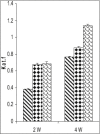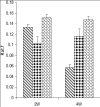Catalase in testes and epididymidis of wistar rats fed zinc deficient diet
- PMID: 20177458
- PMCID: PMC2810050
- DOI: 10.4103/0250-474X.51959
Catalase in testes and epididymidis of wistar rats fed zinc deficient diet
Abstract
Catalase activities have been evaluated in testes and caput and cauda epididymis of Wistar rats fed on zinc deficient diet for 2 and 4 weeks. The enzyme activity has been measured as chromic acetate formed by heating of dichromate (in acetic acid) in presence of H(2) O(2) with perchromic acid as an unstable intermediate. Observed non-significant increase in catalase activity in testes as well as in caput and cauda epididymis of 2 weeks experiments has been related to low levels of H(2) O(2) produced in two organs whereas significant (P<0.01/0.001) increase in catalase activity in 4-weeks experiments indicate for increased oxidative stress due to phagocytotic activity of Sertoli cells in testes and damaged spermatozoa in epididymis. Thus, zinc deficiency increases catalase activity in testes and epididymis.
Keywords: Catalase; and zinc deficiency; epididymis; testes.
Figures



References
-
- Truong-Tran AQ, Ho LH, Chai F, Zalewski PD. Cellular zinc fluxes and the regulation of apoptosis/gene-directed cell death. J Nutr. 2000;130:1459S–66S. - PubMed
-
- MacDonald RS. The role of zinc in growth and cell proliferation. J Nutr. 2000;130:1500S–8S. - PubMed
-
- Oteiza PI, Olin KL, Fraga CG, Keen CL. Oxidant defense system in testes from zinc deficient rats. Proc Soc Exp Biol Med. 1996;213:85–91. - PubMed
-
- Hipler U-C, Gorning M, Hipler B, Romer W, Schreiber G. Stimulation and scavestrogen-induced inhibition of reactive oxygen species generated by rat Sertoli cells. Arch Androl. 2001;44:147–54. - PubMed
-
- Baumber J, Sabeur K, Vo A, Ball BA. Reactive oxygen species promotes tyrosine phosphorylation and capacitation in equine spermatozoa. Theriogenology. 2003;60:1239–47. - PubMed
LinkOut - more resources
Full Text Sources
